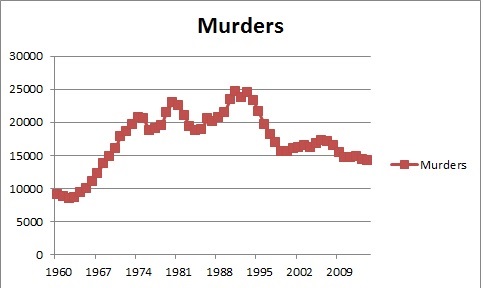
Why is the number of death sentences down in the United States? There is no one reason, but the most obvious and obviously large factor is that the number of murders is way down from the early 90s peak.
Don't look for that fact to appear prominently in the annual report of the Death Penalty Information Center. After all, it doesn't fit the agenda. The dramatic drop in crime in the 1990s with a continuing downward trend to the present is, in part, a success of America's getting tough on crime in the 80s and 90s. The deterrent effect of capital punishment (which there is good reason to believe is real and substantial despite what a certain biased committee's report says) is likely a factor.
What are the other factors? Anecdotally, I have had trial prosecutors tell me that murders that warrant the death penalty are a smaller proportion of the murders as well, although I can't quantify that. Some prosecuting offices that were previously unselective in asking for the death penalty have become more selective. That's a good thing. Anti-DP organizations always say we should reserve the death penalty for the very worst, but when we actually do that they cite the result as evidence the death penalty is in decline.
Finally, and most disturbingly, there is a fatigue factor. I think it is true that some prosecuting offices do not seek the death penalty in cases where it is warranted because the obstruction of the review and execution processes leads them to believe the sentences will not be carried out. The resulting miscarriage of justice is all the more reason to fix those processes.
One final note -- the DPIC continues to intentionally mislead about its own nature in its press releases. "DPIC tracks data on the death penalty, but does not take a position on capital punishment." What utter nonsense. Every single thing DPIC does is to oppose the death penalty. The data they present are carefully filtered so that only facts supporting the abolition argument are presented. Does anyone seriously think that Soros would dump his money into a neutral source of information? The fact that they have not adopted a formal resolution calling for the abolition of the death penalty does not mean they have not taken a position. The entire body of their work is a position.
CJLF and DPIC are both advocacy organizations. The difference is that we are honest about it.
Ashby Jones has this article in the WSJ. Lawrence Hurley reports for Reuters, and Tracy Connor reports for NBC.
Don't look for that fact to appear prominently in the annual report of the Death Penalty Information Center. After all, it doesn't fit the agenda. The dramatic drop in crime in the 1990s with a continuing downward trend to the present is, in part, a success of America's getting tough on crime in the 80s and 90s. The deterrent effect of capital punishment (which there is good reason to believe is real and substantial despite what a certain biased committee's report says) is likely a factor.
What are the other factors? Anecdotally, I have had trial prosecutors tell me that murders that warrant the death penalty are a smaller proportion of the murders as well, although I can't quantify that. Some prosecuting offices that were previously unselective in asking for the death penalty have become more selective. That's a good thing. Anti-DP organizations always say we should reserve the death penalty for the very worst, but when we actually do that they cite the result as evidence the death penalty is in decline.
Finally, and most disturbingly, there is a fatigue factor. I think it is true that some prosecuting offices do not seek the death penalty in cases where it is warranted because the obstruction of the review and execution processes leads them to believe the sentences will not be carried out. The resulting miscarriage of justice is all the more reason to fix those processes.
One final note -- the DPIC continues to intentionally mislead about its own nature in its press releases. "DPIC tracks data on the death penalty, but does not take a position on capital punishment." What utter nonsense. Every single thing DPIC does is to oppose the death penalty. The data they present are carefully filtered so that only facts supporting the abolition argument are presented. Does anyone seriously think that Soros would dump his money into a neutral source of information? The fact that they have not adopted a formal resolution calling for the abolition of the death penalty does not mean they have not taken a position. The entire body of their work is a position.
CJLF and DPIC are both advocacy organizations. The difference is that we are honest about it.
Ashby Jones has this article in the WSJ. Lawrence Hurley reports for Reuters, and Tracy Connor reports for NBC.


Leave a comment